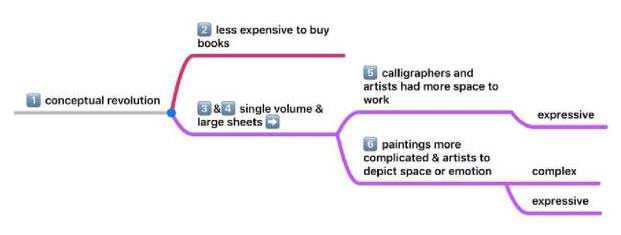突破托福阅读非常规 “修辞目的题”
2021-11-29 10:01 | 编辑:川外外语培训中心 来自:未知在托福阅读里,有一类题叫“修辞目的题”,出题 频率为 1-2 道/每篇。实际考试中的问法类似于“Why does the author mention XXX?”这里所谓的“修辞”, 即作者为了提高表达效果所用到的写作手法。文学类的作品里用“比喻”“排比”之类的修辞手法,为的是使表达更生动形象。
而用在托福考试阅读这样学术类的文章里,自然是为了更好地证明诠释作者的观点或理论。 因此“修辞目的题”的答案多与被作者提到,即题目中提到的内容,所支持的观点有关。这就是为什么,该类题型的常规解法就是根据题目中提到的文章内容,找到其支持的观点句。因为大部分情况下,观点句在先,例证句在后。
所以,同学们在找到题干中的“XXX”之后, 再往前找到其支持的句子即可,且两个句子一前一后不会相隔较远。
下面请看例1
Joy and sadness are experienced by people in all cultures around the world, but now can we tell when other people are happy or despondent? It turns out that the expression of many emotions may be universal. Smiling is apparently a universal sign of friendliness and approval. Bearing the teeth in a hostile way, as noted by Charles Darwin in the nineteenth century, may be a universal sign of anger. As the originator of the theory of evolution,Darwin believed that the universal recognition of facial expressions would have survival value. For example, facial expressions could signal the approach of enemies (or friends) in the absence of language. (OG Test 1 The Expression of Emotions)
The author mentions “Baring the teeth in a hostile way” in order to
(A) Differentiate one possible meaning of a particular facial expression from other meanings of it
(B) Support Darwin's theory of evolution
(C) Provide an example of a facial expression whose meaning is widely understood
(D) Contrast a facial expression that is easily understood with other facial expressions
这个题可以用到常规的解法——找例子支持的观点句。
我们发现 “Baring the teeth…” 这一句的前一句为一个与该句并列的例证句,它们共同证明的是 “It turns out that the expression of many emotions may be universal.” 这句话。那么,可以得知该段这 一部分的结构为“观点-例子1-例子2”。因此答案为C。
然而,这种常规的方法,并不能应对练习或考试中 所有的“修辞目的题”。因为作者在行文时,为了证明观点,可能会用到多种结构的表达方式。而我们考生需要注意的,就是缕清题干中提到的信息与上下句之间的 关系,灵活而又有效地找到作者想借此表达的观点。
下面我们来看例2
For years historians have sought to identify crucial elements in the eighteenth-century rise in industry, technology, and economic power known as the Industrial Revolution, and many give prominence to the problem of energy. Until the eighteen century, people relied on energy derived from plants as well as animal and human muscle to provide power. Increased efficiency in the use of water and wind helped with such tasks as pumping, milling, or sailing. However, by the eighteenth century, Great Britain in particular was experiencing and energy shortage. Wood, the primary source of heat for homes and industries and also used in the iron industry as processed charcoal, was diminishing in supply. Great Britain had large amounts of coal; however, there were not yet efficient means by which to produce mechanical energy or to power machinery. This was to occur with progress in the development of the steam engine. (TPO 26 Energy and the Industrial Revolution)
Why does the author provide the information that “Great Britain had large amounts of coal”?
(A) To reject the claim that Britain was facing an energy shortage in the eighteen century
(B) To explain why coal rather than other energy resources became the primary source of heat for homes and industries in eighteencentury Britain
(C) To indicate that Britain's energy shortage was not the result of a lack of fuel
(D) To explain why coal mining became an important industry in nineteenth-century.
大家先自己思考一下,这个题的答案。
不着急看答案
该题的正确答案为 C。而有不少同学会选择 A。
我们一起来追溯选 A 的同学的错误思路。
“Great Britain had large amounts of coal” 意思是 “英国有大量的煤”。
往前找被支持的观点句, 前一句说“Wood,…, was diminishing in supply.” 意为“木材供应不足” 。
所以 “coal” 和 “wood” 这两句都是客观事实举例,还应该往前找,再 前一句话是 “However, by the eighteenth century, Great Britain in particular was experiencing and energy shortage.” 即 “十八世纪的英国正在经 历能源短缺”,此句为概括句。
那么刚才读过的三 句话的关系是 “缺能源-缺木材-不缺煤”。而 “Great Britain had large amounts of coal“ 之 后 还 有 个 ”however“ , 可能就是想反驳 “十八世纪的英国 正在经历能源短缺”。
那么答案为 A—— “反驳十八世 纪的英国正在经历能源危机这一观点”。
同学们,我们来一起分析一下上面这个思路的漏洞出现在哪里?
出现在第一步和第二步之间。 “Great Britain had large amounts of coal” 和 “Wood, …, was diminishing in supply.” 两句真的是并列句吗?
所谓的并列句,应该是从结构和内容上来说,基本上可以做到对应的两个句子。
而 “coal”所在的句子,是由“however”连接的两个转折关系的句子组成。所以,两句并没有构成并列关 系。
要说 “However, by the eighteenth century, Great Britain in particular was experiencing and energy shortage.” 和 “Wood, …, was diminishing in supply.” 是概括和举例之间的关系,“Great Britain had large amounts of coal, however,there were not yet efficient means by which to produce mechanical energy or to power machinery.” 就是说的另一件事。由于转折关系是在 句子内部,所以并没有把前面的事实否定掉,但重点 强调的是“缺乏有效的方法去产生推动机器的机械能”。
因此,答案为 C。
我们再来看一道例题:
1. The introduction of paper spurred a conceptual revolution whose consequences have barely been explored.
2. Although paper was never as cheap as it has become today, it was far less expensive than parchment, and therefore more people could afford to buy books.
3. Paper is thinner than parchment, so more pages could be enclosed within a single volume.
4. At first, paper was made in relatively small sheets that were pasted together, but by the beginning of the fourteenth century, very large sheets – as much as a meter across – were available.
5. These large sheets meant that calligraphers and artists had more space on which to work.
6. Paintings became more complicated, giving the artist greater opportunities to depict space or emotion. The increased availability of paper, particularly after 1250, encouraged people to develop systems of representation, such as architectural plans and drawings. This in turn allowed the easy transfer of artistic ideas and motifs over great distances from one medium to another, and in a different scale in ways that had been difficult, if not impossible, in the previous period.
Why does the author include the following information: “At first, paper was made in relatively small sheets that were pasted together, but by the beginning of the fourteenth century, very large sheets – as much as a meter across – were available.”?
(A) To provide evidence that the development of papermaking techniques was very slow.
(B) To explain why paper was never as cheap as it has become today.
(C) To make the point that paper allowed artists to develop paintings that were more expressive and complex.
(D) To prove that paper was more popular with artists who used large sheets, than it was with book printers, who used smaller sheets.
还是大家先自己思考一下,这个题的答案。
不着急看答案。
这个题的正确答案为 C。
我们通过一个思维导图来缕清该段各句之间的逻辑关系。

通过上面这个图可以得知,作者提到 “At first, paper was made in relatively small sheets that were pasted together, but by the beginning of the fourteenth century, very large sheets – as much as a meter across – were available.” 即第 4 句话(纸张的变化), 是为第 5 句和第 6 句中提及的事情提供的原因(从 第5句中的meant这个隐形因果逻辑词即可以看 出)。
而第 5、6 句又是对第 1 句 “a conceptual revolution” 的具体体现。所以,文中提到第 4 句, 重点是想引出第 5、6 句中的结果。
通过以上的内容可以看到,修辞目的题的做法绝 不是一个公式化的套路。需要同学们结合具体的题目, 以“支持作者的观点”为导向,利用“句子间的逻辑 关系”,得出合理的答案。
上一篇:怎么解决托福口语中的中式口音
下一篇:托福口语如何高效备考

- [焦点] 携带全球胜任力 与2025一起新出发
- [焦点] 雅思6.5分:迈向国际舞台的坚实基
- [焦点] 雅思备考黄金期揭秘:几个月最合适
- [焦点] 揭秘雅思写作高分秘籍:素材积累与
- [焦点] 写作秘籍大放送!雅思写作提分,我
- [焦点] 雅思写作逆袭指南:解锁小作文,告
- [焦点] 官方秘籍:如何摆脱“雅思紧张体质
- [焦点] 雅思听力高分秘籍:避开陷阱,轻松
- [焦点] 雅思破7全攻略:不收藏后悔一年!
- [焦点] 8月雅思高分秘籍大公开!你准备好











